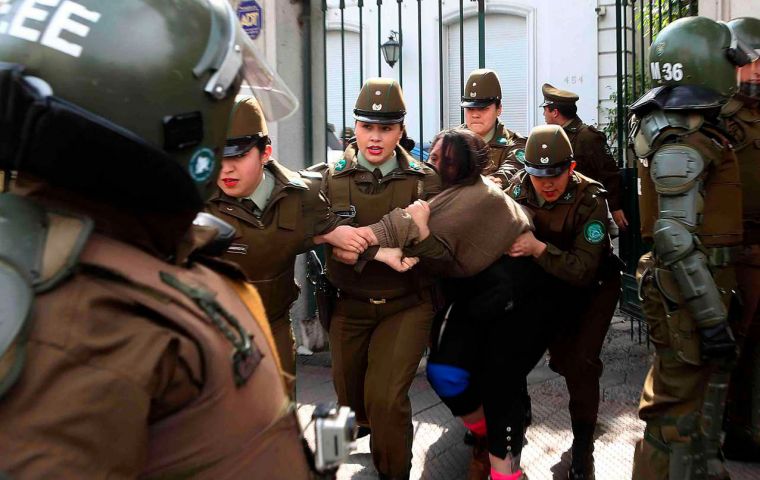MercoPress. South Atlantic News Agency
New Chilean government faces challenge of Mapuche violence: some 70 attacks in three weeks
 Carabineros reported 46 actions related to rural violence and 37 attacks in the Bio Bio region, between March 11 and April 6
Carabineros reported 46 actions related to rural violence and 37 attacks in the Bio Bio region, between March 11 and April 6 Violence in the south of Chile is on the rise and the newly installed government of president Gabriel Boric is showing greater concern following the rejection of conciliatory messages by the indigenous Mapuche who is demanding land in La Araucaria, which they claim belongs to their ancestors, and now is occupied and exploited by forestry companies and farmers.
According to the latest official report from Carabineros, Chile's militarized police, 46 actions related to rural violence and 37 attacks in the Bio Bio region have taken place between March 11 and April 6. President Boric took office on March 10, and pledged to lift the emergency measures, “a state of Constitutional Exception”, which his administration inherited from outgoing president Sebastian Piñera.
Piñera mandated the emergency measures, including Army patrolling, with congressional approval, following attacks on farmers' homes, forestry assets, arson on trucks, intimidating workers and drivers, plus the shoot out deaths of several residents in the area and of law enforcement officers.
However despite the fact that the new Home Secretary and Public Security, Izca Siches has Chilean indigenous roots and promised negotiations to ease the dispute including the end of emergency measures, in March when a caravan of vehicles with the minister entered the so called “red zone” in the conflict area, there were shots, barricades, threats and a display of heavily armed groups.
This official convoy turned back, despite the fact that minister Siches intended to visit a family whose son in 2018 had been shot dead by Carabineros and the investigation had been boxed.
According to Chilean media during 2021, the number of violent actions in the conflict area claimed by Mapuche radical groups reached some 1,200 and eight people were killed.
The new administration of president Boric finally lifted the exceptional measures, but Mapuches were not satisfied since the responsibility is now totally on the Carabineros which have been in the front line of the conflict for decades. Army patrols, when the exceptional measures could only shoot back if and when attacked.
In related news a criminal court in Santiago sentenced a young man, 24 to twelve years in prison for setting on fire a metro station in October 2019, when the social uprising in Chile that shook and exposed the vulnerability of the Chilean economic system.
Daniel Bustos Trabol who has been in custody was sentenced after a two weeks court trial since the arson attack with “an inflammable object” with the intention of “damage” was considered a very serious crime. The San Pablo metro station was burnt to the ground, affecting public transport for almost eight months in Metropolitan Santiago. “Some 100,000 people who travelled daily suffered the consequences of the arson attack” Rebuilding the station was estimated to have cost some 18 million dollars.
In reading the sentence the judge pointed out to the excellent work displayed by the Prosecution and the police investigation, with the support from Metro staff and the subway company. Plaintiffs in the case were the City of Santiago and the Metro company.




Top Comments
Disclaimer & comment rulesCommenting for this story is now closed.
If you have a Facebook account, become a fan and comment on our Facebook Page!